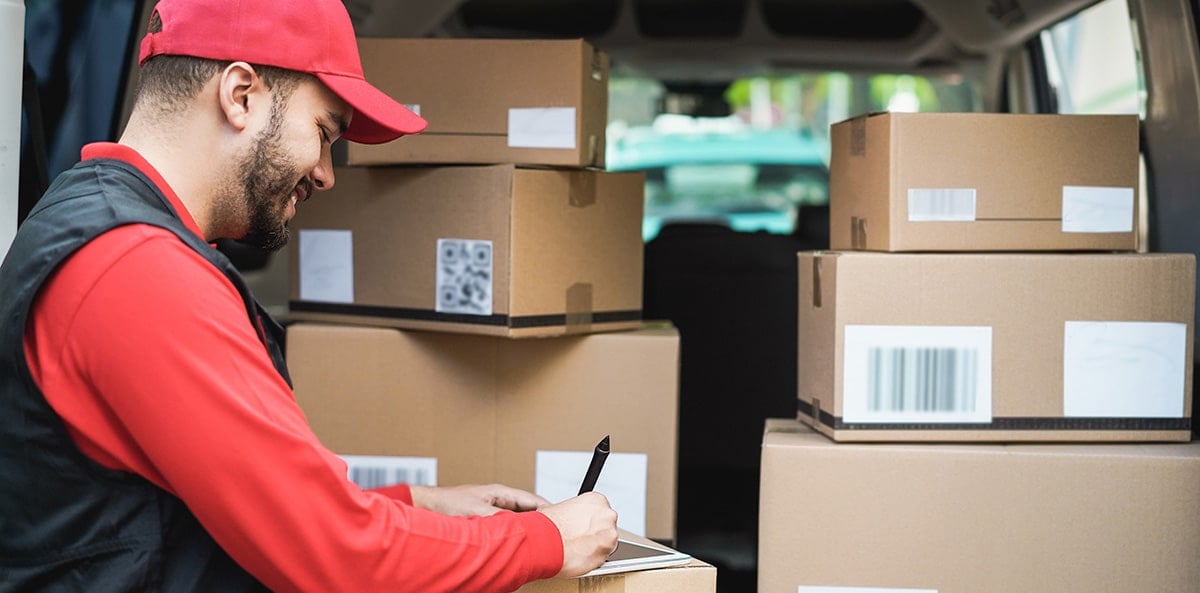How to get delivery and courier contracts

- What is a contracted delivery driver?
- How do you become a contracted delivery driver?
- What can I specialize in as a contracted delivery driver?
- What business and license requirements need to be met to be a contracted delivery driver?
- How can I build my online presence as a delivery driver?
- Where can I find “help wanted” ads for delivery driving?
- How can I network to increase my delivery contracts?
- After I’ve gained a little experience, how can I grow my delivery contract business?
- What can I do to help me build a strong reputation as a delivery driver?
- How much can I earn from delivery contracts?
- Get delivery business insurance with Insureon
What is a contracted delivery driver?
As a contracted delivery driver, other businesses will rely on you to take something from one point to another. It can include business-to-business (B2B)—where you’re dropping something off at another business, such as documents they need signed—or business-to-consumer (B2C), where you’re delivering to an end customer, like groceries.
How do you become a contracted delivery driver?
One of the great things about being a delivery driver or an independent courier is that there isn’t much training or capital needed to start. You may already have the necessary equipment, skills, and abilities to become one today. Here are the key elements to begin working as a delivery driver:
- Possess a valid driver’s license with a clean driving record
A commercial driver’s license (CDL) may or may not be necessary, depending on the items you’re transporting and the type of vehicle you’ll be using. - Own and maintain a reliable and well-maintained vehicle suitable for courier services
Usually, this is just a personal vehicle, such as a car, pickup truck, or van. However, depending on your loads, something more substantial may be required. - Manage time efficiently
This ability is critical because a big part of your job will be adhering to schedules and making timely deliveries. - Be capable of lifting and carrying packages of varying weights
You never know what will turn up as your item to be delivered, and you don’t want to waste money or time by showing up and not being able to move it.

What can I specialize in as a contracted delivery driver?
While you can choose to deliver anything and everything, you’ll find identifying and developing a niche will build your customer base and your small business. It’ll also allow you to bid more effectively because you’ll be very familiar with what you’re pricing.
Here are some common types of courier jobs and delivery services you could specialize in:
- Local courier services
Couriers often transport documents and small parcels. This is normally B2B. - Food and grocery deliveries
Apps like Uber Eats, Grubhub, and Instacart have popularized this, but many restaurants and stores also have their own delivery systems. - Cannabis deliveries
It’s a violation of federal law to transport marijuana across state lines. However, in states that have legalized recreational marijuana, many dispensaries offer delivery to customers. State and local governments regulate how deliveries can be made. Often, they’re only allowed during certain hours, drivers must be over 21 years old, and many require real-time GPS tracking. You can also be a B2B delivery person, transporting cannabis between the cultivation, manufacturing, or distribution locations. - Pharmaceutical and medical deliveries
Depending on what you’ll be handling for the drugstore or pharmacy, you may need extra training. For instance, if you’re delivering prescriptions or medical supplies and devices like a walker to someone’s home, no training is necessary. But suppose you’re going to be picking up and dropping off things like blood and lab specimens. In that case, you may need to complete the HIPAA and/or OSHA training for regulatory compliance, along with a handling course on proper procedures for packaging, transporting, and storing specimens. - Retail or e-commerce last-mile deliveries
This is the part of the delivery consumers are most familiar with because it’s when the item they bought ends up at their door. Often, last-mile delivery starts at a distribution warehouse in the area, and then the delivery person takes it from there to the shipping address. - Freight or bulk item deliveries
This type of service is often used because a customer can’t fit the item in their car, shipping may be cost-prohibitive. Because of the larger size of these deliveries, a box truck or cargo van may be required. It could involve local delivery or something more long-distance.
As you develop your business plan as an independent contractor, identify the gaps in the market and capitalize on those opportunities. You’ll want to find something you’re not only interested in, but that works with your vehicle type and licenses. That way, you can get your delivery and courier business going quickly without a lot of startup expenses.
Before awarding a contract, almost all clients will require proof of insurance to know you’re legitimate and can financially cover any issues that may arise.
What business and license requirements need to be met to be a contracted delivery driver?
Before you bid on projects, you’ll want to make sure you have the proper paperwork in order. This includes registrations, licenses, and insurance. Here are a few items you’ll want to check on. Some may be necessary for your company, while others won’t be.
Licenses
- Business license
To determine whether you need a business license, you’ll first have to decide on the structure of your company. Then, you can check the requirements for your state and local government to find out if you need to apply for one. - Commercial driver’s license (CDL)
This is determined by what you’re driving and what you’re hauling. If your vehicle weighs over 26,000 pounds or you're carrying 16 or more passengers or hazardous materials, you’ll need a CDL.
Registrations
- DOT number or MC number
These are identifying numbers issued by the Department of Transportation (DOT) and its Federal Motor Carrier Safety Administration (FMCSA). However, the FMCSA has phased out MC numbers and have not been issuing new ones since October 2025. - Standard car registration
Your car should be properly registered and titled in the state where you live.
Insurance
- Commercial auto
All states but one require commercial auto insurance coverage for business-owned vehicles. Even if you do your work in your daily driver, your personal auto insurance won’t cover your claim if you’re using it for business purposes at the time of the accident. If you’re a sole proprietor and use your vehicle for your delivery business, then you should get a commercial auto policy, because under that type of business structure, the car would be de facto owned by the business. - Hired and non-owned auto (HNOA)
Hired and non-owned auto (HNOA) insurance comes into play when your company uses rented or leased vehicles – ones that aren’t technically owned by the company. It also covers the use of personal vehicles, especially for rideshare and other delivery app drivers. If you’re having a hard time determining if you should sign up for commercial auto or HNOA insurance, this page helps break it down. - General liability
General liability insurance is usually considered when you have a place of business, because it helps protect against third-party injuries, such as if a client slips and falls in your office. But even as a delivery driver, general liability is important because it also handles third-party property damage you cause. For example, if you put a heavy box on an antique chair and the chair breaks, then your general liability policy would cover it. - Commercial property
As a delivery driver, it's possible that you don’t have a physical location, such as an office or warehouse. However, if you do, then you’ll want to have commercial property insurance. It would cover losses from theft, fires, vandalism, and some weather incidents, not only for the building itself, but also the contents inside. - Business owners policy
A business owner’s policy (BOP) combines general liability coverage and commercial property insurance in one policy. It’s usually less expensive than buying each separately. - Inland marine
If you specialize in a certain type of delivery, you may need inland marine insurance, which provides coverage for business property while it’s in transit. For example, if you are a medical courier and you must keep specimens at a stable temperature, you may have a refrigerator in your vehicle to store them. This type of equipment would be covered under your inland marine policy. - Cargo
This is a specialized type of inland marine insurance that protects the actual goods you’re transporting. It covers perils like fire, theft, collision, and natural disasters and applies during transport, loading, and unloading. - Workers’ compensation
Workers’ compensation insurance helps protect employees from expenses due to work-related injuries or illnesses. In most states, you’re required to get workers’ comp as soon as you hire your first employee. If you’re self-employed and have no workers, it still might be a good idea to get a policy, because your health insurance likely won’t pay for medical bills or lost wages due to on-the-job incidents.
Do I need insurance to get a delivery contract?
Before awarding a contract, almost all clients will require proof of insurance to know you’re legitimate and can financially cover any issues that may arise. At the very least, most businesses will insist on you having commercial auto and general liability insurance. To confirm your coverage, they’ll want you to furnish a certificate of insurance (COI).

How can I build my online presence as a delivery driver?
Just like with everything else these days, it’s important to make sure your internet persona is dialed in. To get as many contracts as possible, you’ll want your potential clients to see you as competent and qualified before they even meet you. That starts with a professional online presence and marketing strategies. You’ll want to give attention to the following:
- Website: Build at least a basic website that states your services, geographic area of coverage, and contact information.
- Business Profiles: Establish your company on Google Maps, Yelp, and other local directories. This will not only allow potential customers to find you, but also let past clients leave reviews.
- Social Media: Create accounts on LinkedIn, Facebook, Instagram, or whatever platforms generate views. Use it for networking and showcasing testimonials. It’s important to post regularly to keep the content fresh.
Where can I find “help wanted” ads for delivery driving?
There are several gig-based or brokered platforms that offer delivery contracts or freight opportunities. Load boards are where shippers and brokers post loads they need hauled, and drivers can bid on them. Getting work through these can help build experience and grow your reputation for larger direct contracts later.
Popular platforms for courier or gig delivery:
- DoorDash
- Uber Eats
- Instacart
- Shipt
- Curri
- Dropoff
There are specialized apps, too, like RxCourier, which caters to the healthcare industry.
Load boards to find larger loads and freight hauls:
- DAT
- Truckstop
- uShip
- Amazon Relay
How can I network to increase my delivery contracts?
A big part of building your delivery business will be putting yourself out there. With that in mind, direct outreach is a great way to begin. It can lead to long-term delivery contracts with local businesses. Here are some types of businesses you might pursue:
- Pharmacies
- Medical facilities
- Restaurants
- Grocery stores
- Cannabis dispensaries
- Print shops
- Law offices
- Warehouses and third-party logistics providers (3PLs)
While you can cold call via email or phone, the method that’ll have the most impact will be a face-to-face meeting. So grab a stack of business cards and pound the pavement trying to make personal contact with the manager or person responsible for shipping.
Be prepared to answer questions about rates, service areas, and insurance coverage. Later that day or the next, you might follow it up with a LinkedIn request so you stay top-of-mind and get your brand out there. These types of nearby partnerships can really grow your customer base.

After I’ve gained a little experience, how can I grow my delivery contract business?
Once your business is established, you can pursue larger, more stable delivery contracts through public procurement opportunities. There are several different websites with job postings, depending on the type of government contract you’re looking for.
- Federal government contract opportunities are at sam.gov.
- Local and state governments host their bidding portals.
- Procurement sites like BidNet Direct and GovWin have a subscription model where you pay to use their services.
The same can be done on the private side. Many corporations post requests for proposals, and you can bid on them for delivery contracts. In both cases, you’ll want to be sure your business is registered and you have the appropriate North American Industry Classification System (NAICS) code.
What can I do to help me build a strong reputation as a delivery driver?
The most important thing you’ll need to do is be a great delivery driver. That means, first and foremost, being reliable. Deliver your jobs on time and communicate clearly with your clients, and focus on customer satisfaction. It’s also crucial to maintain your vehicle and update your insurance to minimize problems and unforeseen issues.
When your client is pleased with your work, ask if they’d be willing to give a testimonial or post an online review. You can also begin a referral program to incentivize your customers to recommend you to others.
How much can I earn from delivery contracts?
Earnings vary by location, niche, and vehicle type, but contracts offer more stability than one-off gigs. High-paying contracts are often found in the medical, freight, and government sectors. You’ll also typically be compensated at a premium for last-minute or rush jobs.
As you build contracts, you’ll be able to optimize delivery routes as well. With some efficient route planning, you can streamline your delivery jobs, cutting down on time and fuel costs, which will help your bottom line.
Get delivery business insurance with Insureon
It’s easy to get delivery business insurance quotes with Insureon. Simply start your quote online. If you need any help answering questions on the application, one of our expert agents can assist.
Once submitted, we’ll gather affordable rates from respected insurance providers across the country and send you your options. After you choose a plan, coverage can typically start within 24 hours. You’ll also be able to access necessary paperwork, such as your certificate of insurance (COI), online.
Sara Singh, Contributing Writer
Sara’s career has taken her across the writing spectrum. She started as a television news producer, then was hired as the marketing manager for a financial services firm. After working for the publisher of the world’s most widely circulated magazine, Sara went into the agency scene as a copywriter and finally served as the in-house content writer for a tech consultancy. Now, she freelances for a variety of clients so she can have the flexibility to do volunteer work and travel.









